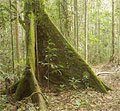Preserving Indonesia’s tropical forests by selling credits for the billions of tons of carbon they contain could be as profitable as razing the forests to grow palm oil, according to a new study. The study, published in the journal Conservation Letters, said that saving the forests could generate just as much money as destroying them if a global carbon market is established that prices carbon at $10 to $33 per ton. Under the conservation program known as REDD — Reducing Emissions from Deforestation and Degradation — governments, businesses, and investors would buy credits on a global market that would enable them to emit more carbon than allocated under so-called cap-and-trade programs. The money spent on those credits could be used to pay the Indonesian government or landowners not to destroy tropical forests to grow palm oil, a highly profitable crop. The spread of oil palm plantations has led to massive destruction of Indonesia’s tropical forests. The study, conducted by an Australian biologist, said that 8.2 million acres of forest on Kalimantan on the island of Borneo are soon scheduled to be cleared for palm oil plantations.
Selling Forest CO2 Credits Could Equal Profits from Palm Oil Farms
More From E360
-
ANALYSIS
Carbon Offsets Are Failing. Can a New Plan Save the Rainforests?
-
Energy
Facing a Hostile Administration, U.S. Offshore Wind Is in Retreat
-
Biodiversity
As Jaguars Recover, Will the Border Wall Block Their U.S. Return?
-
WATER
An E.U. Plan to Slash Micropollutants in Wastewater Is Under Attack
-
INTERVIEW
This Data Scientist Sees Progress in the Climate Change Fight
-
Climate
As Floods Worsen, Pakistan Is the Epicenter of Climate Change
-
Climate
Heat Stress Is a Major Driver of India’s Kidney Disease Epidemic
-
Energy
It’s a ‘Golden Age’ for U.S. LNG Industry, But Climate Risks Loom
-
Climate
How Climate Risks Are Putting Home Insurance Out of Reach
-
INTERVIEW
Inside the Plastics Industry Playbook: Delay, Deny, and Distract
-
Biodiversity
Freeing Captive Bears from Armenia’s Backyards and Basements
-
Food & Agriculture
In Indonesia’s Rainforest, a Mega-Farm Project Is Plowing Ahead
